高中英语作文:成为一个专才还是通才
要成为通才还是专才英语作文
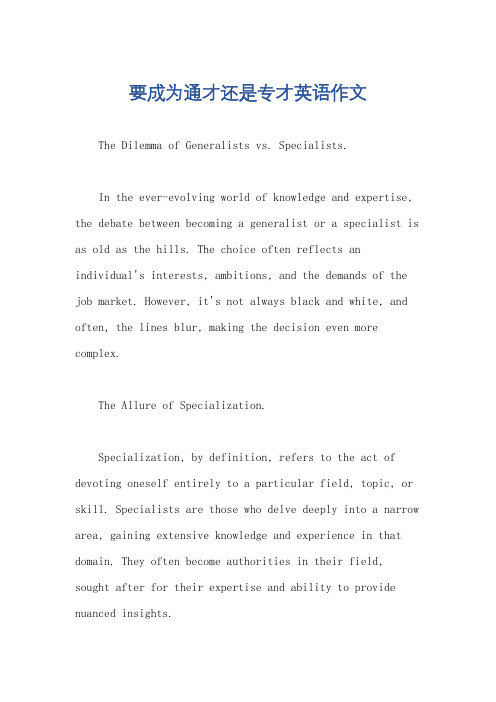
要成为通才还是专才英语作文The Dilemma of Generalists vs. Specialists.In the ever-evolving world of knowledge and expertise, the debate between becoming a generalist or a specialist is as old as the hills. The choice often reflects anindividual's interests, ambitions, and the demands of the job market. However, it's not always black and white, and often, the lines blur, making the decision even more complex.The Allure of Specialization.Specialization, by definition, refers to the act of devoting oneself entirely to a particular field, topic, or skill. Specialists are those who delve deeply into a narrow area, gaining extensive knowledge and experience in that domain. They often become authorities in their field, sought after for their expertise and ability to provide nuanced insights.The benefits of specialization are numerous. Firstly, it allows for a deeper understanding of a subject, enabling one to master complex concepts and techniques. This depth of knowledge often leads to innovation and the development of new ideas or solutions. Secondly, specialization can lead to professional recognition and success. In fieldslike medicine, law, or engineering, for instance, specialization is not just a choice but a requirement for practicing the profession.Moreover, with the ever-increasing pace of technological advancements, the need for highly skilled specialists is on the rise. Fields like artificial intelligence, biotechnology, and cybersecurity require a high level of expertise, making specialization a lucrative career choice.The Appeal of Generalism.On the other hand, generalism involves having a broad range of knowledge and skills across multiple fields.Generalists are often described as "jacks of all trades" who can adapt to different situations and contexts, leveraging their diverse knowledge to solve problems.The advantages of being a generalist are also significant. Firstly, it fosters creativity and innovation. By combining ideas and insights from different fields, generalists can create new perspectives and solutions that specialists might overlook. Secondly, generalism enhances adaptability. In a world that's constantly changing, the ability to adapt to new situations and challenges is crucial. Generalists, with their diverse skill sets, are often more resilient in the face of change.Moreover, generalism can lead to better communication and collaboration. By speaking multiple "languages" of different fields, generalists can bridge gaps between disciplines, facilitating better understanding and cooperation. This is especially valuable in today's interdisciplinary world, where problems often require a multi-faceted approach.The Gray Area.However, the reality is often more nuanced than a simple choice between generalization and specialization. Many successful individuals and professionals exhibit a blend of both traits. They might have a primary specialization but possess enough breadth of knowledge to appreciate and integrate ideas from other fields. This "T-shaped" skill set, with a deep vertical knowledge in one area and a broad horizontal knowledge across others, is becoming increasingly valuable in today's world.Moreover, with the advent of new technologies and the convergence of different fields, the lines between specialization and generalization are becoming increasingly blurred. Fields like data science, for instance, require a combination of technical expertise in areas like statistics and programming, as well as a broad understanding of the problem context and the ability to communicate with non-technical stakeholders.Conclusion.In the end, the choice between becoming a generalist or a specialist depends on individual interests, career goals, and the demands of the job market. There is no one-size-fits-all answer. What's important is to have a clear understanding of one's strengths, weaknesses, and passions, and to continuously seek opportunities to grow and learn, regardless of whether one chooses to specialize or generalize.The future, after all, belongs to those who are willing to embrace both depth and breadth of knowledge, and to use their skills and insights to create a better world.。
专才与全才作文800字
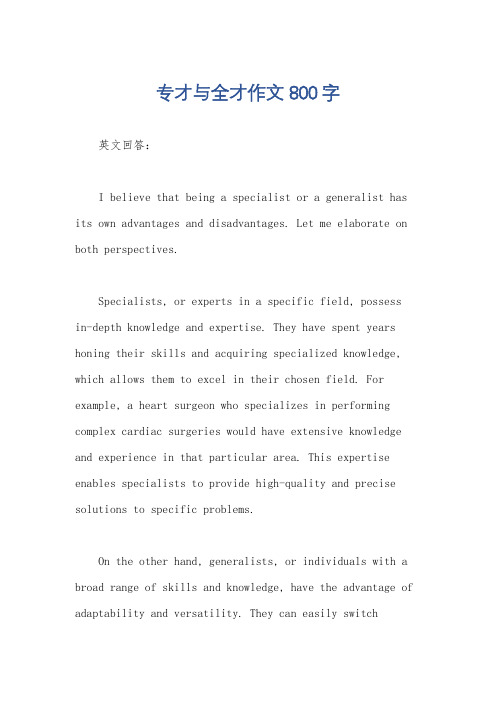
专才与全才作文800字英文回答:I believe that being a specialist or a generalist has its own advantages and disadvantages. Let me elaborate on both perspectives.Specialists, or experts in a specific field, possess in-depth knowledge and expertise. They have spent years honing their skills and acquiring specialized knowledge, which allows them to excel in their chosen field. For example, a heart surgeon who specializes in performing complex cardiac surgeries would have extensive knowledge and experience in that particular area. This expertise enables specialists to provide high-quality and precise solutions to specific problems.On the other hand, generalists, or individuals with a broad range of skills and knowledge, have the advantage of adaptability and versatility. They can easily switchbetween different tasks and handle various challenges. Generalists are often considered to be well-rounded individuals who can contribute effectively in multiple areas. For instance, a generalist manager who has a good understanding of different departments within a company can effectively coordinate and communicate between teams, ensuring smooth operations.In the professional world, the choice between being a specialist or a generalist often depends on the nature of the job and the individual's career goals. Some professions require deep expertise in a specific area, such as research scientists or engineers. In these fields, being aspecialist is crucial for making groundbreaking discoveries or developing innovative solutions. However, in rapidly changing industries or entrepreneurial ventures, having a generalist mindset can be advantageous. Generalists can quickly adapt to new situations, learn new skills, and take on diverse responsibilities.It is important to note that the distinction between specialists and generalists is not always clear-cut. Manyprofessionals possess a combination of specialized knowledge and a broad skill set. These individuals are known as "T-shaped" professionals, as they have deep expertise in one area (the vertical bar of the "T") and a broad understanding of other domains (the horizontal bar of the "T"). This combination allows them to bring a unique perspective to problem-solving and collaboration.In conclusion, both specialists and generalists have their own strengths and weaknesses. The choice between the two depends on the specific requirements of the job and the individual's career goals. It is also worth consideringthat the line between specialists and generalists is often blurred, and possessing a combination of both skills can be highly valuable in today's dynamic and ever-changing professional landscape.中文回答:我相信成为专家或全才都有各自的优势和劣势。
专才好还是通才好的英语作文
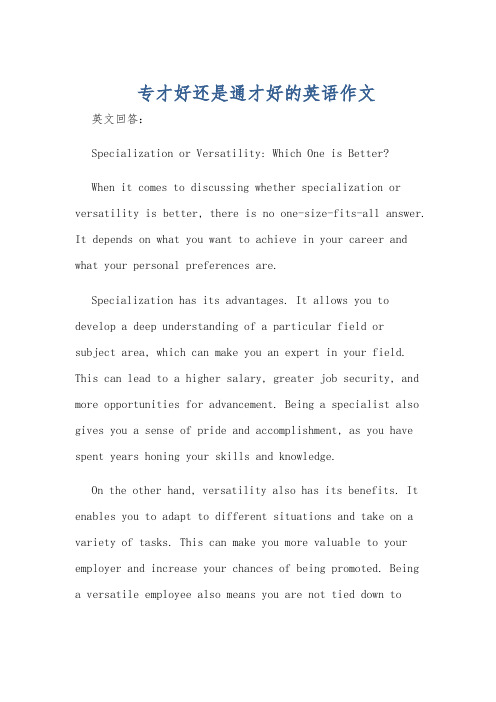
专才好还是通才好的英语作文英文回答:Specialization or Versatility: Which One is Better?When it comes to discussing whether specialization or versatility is better, there is no one-size-fits-all answer. It depends on what you want to achieve in your career and what your personal preferences are.Specialization has its advantages. It allows you to develop a deep understanding of a particular field orsubject area, which can make you an expert in your field. This can lead to a higher salary, greater job security, and more opportunities for advancement. Being a specialist also gives you a sense of pride and accomplishment, as you have spent years honing your skills and knowledge.On the other hand, versatility also has its benefits. It enables you to adapt to different situations and take on a variety of tasks. This can make you more valuable to your employer and increase your chances of being promoted. Being a versatile employee also means you are not tied down toone particular job or industry, which can be advantageousin a fast-changing job market.Ultimately, the decision to specialize or be versatile depends on your career goals and personal preferences. If you are passionate about a particular field and want to become a recognized expert, then specialization may be the way to go. If you prefer variety and want to keep your options open, then versatility may be the better choice.中文回答:专才好还是通才好?当涉及到讨论专才和通才哪个更好时,没有一种通用的答案。
通才与专才英语作文

通才与专才英语作文In today's society, there is an ongoing debate about whether it is better to be a generalist or a specialist. Some argue that being a generalist, or having a wide range of knowledge and skills, is more advantageous in the modern world. Others believe that being a specialist, or focusing on a specific field or expertise, is the key to success. In my opinion, both generalists and specialists have their own strengths and weaknesses, and the ideal approach depends on individual circumstances.On one hand, generalists possess a broad knowledge base and are adaptable to various situations. They have the ability to connect ideas from different fields and apply them to solve problems. For example, a generalist who has knowledge in both business and technology can identify opportunities for innovation and create new products or services. Furthermore, generalists are more likely to have a well-rounded education and can engage in meaningful conversations on a wide range of topics. This can lead tobetter communication and understanding with others, as well as the ability to think critically and creatively.On the other hand, specialists have in-depth knowledge and expertise in a specific field. They dedicate their time and effort to mastering a particular subject, which allows them to become highly skilled and knowledgeable in that area. This can lead to greater efficiency and effectiveness in their work, as they are able to focus on a specific task or problem. Additionally, specialists often have more opportunities for career advancement and higher salaries, as their expertise is highly valued in the job market.However, there are also drawbacks to both generalists and specialists. Generalists may lack the depth of knowledge and expertise that specialists possess. They may struggle to compete with specialists in certain fields, especially in highly technical or specialized industries. On the other hand, specialists may face difficulties whenit comes to adapting to new situations or acquiring new skills. They may become too narrowly focused and miss out on opportunities outside of their area of expertise.In conclusion, the choice between being a generalist or a specialist depends on individual circumstances and goals. Both approaches have their own advantages and disadvantages. It is important to consider factors such as personal interests, career aspirations, and the demands of the job market. Ultimately, a combination of both generalist and specialist skills may be the most beneficial, as it allows individuals to have a broad foundation of knowledge while also developing expertise in a specific area.。
专才和通才英文作文

专才和通才英文作文I believe that everyone has their own unique talents and abilities. Some people are "specialists" who excel in a specific area, while others are "generalists" who have a wide range of skills and knowledge.Specialists are like experts in their field. They have deep knowledge and expertise in a specific area, and they are able to solve complex problems and make significant contributions in their specialized field. They are the go-to people when you need in-depth knowledge and specialized skills.On the other hand, generalists are like jacks of all trades. They have a broad range of skills and knowledge, and they are able to adapt to different situations and learn new things quickly. They are versatile and flexible, and they can handle a variety of tasks and challenges with ease.Specialists may be highly sought after for their expertise, but generalists also have their own advantages. In today's fast-paced and ever-changing world, the ability to adapt and learn new skills is becoming increasingly important. Generalists are able to see the big picture and make connections between different fields, which can lead to innovative solutions and breakthroughs.While specialists may be more focused and in-depth in their knowledge, generalists are able to bring a fresh perspective and think outside the box. They are able to see the connections between different fields and come up with creative solutions to complex problems.In conclusion, both specialists and generalists have their own unique strengths and abilities. It's important to recognize and appreciate the value that each brings to the table. Whether you are a specialist or a generalist, embracing your own talents and abilities is key to success.。
通才与专才作文素材
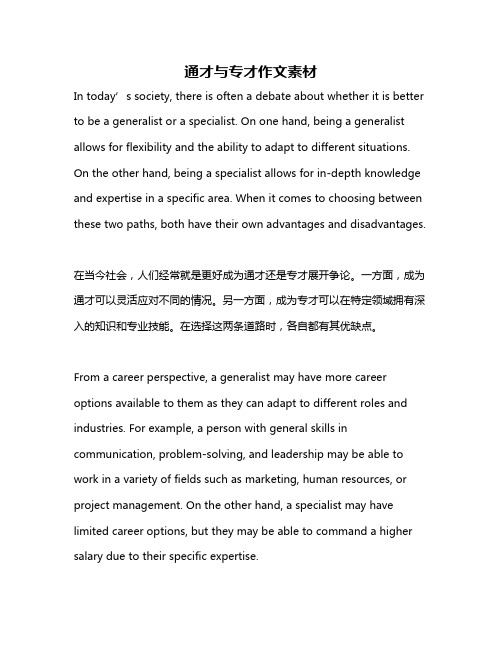
通才与专才作文素材In today’s society, there is often a debate about whether it is better to be a generalist or a specialist. On one hand, being a generalist allows for flexibility and the ability to adapt to different situations. On the other hand, being a specialist allows for in-depth knowledge and expertise in a specific area. When it comes to choosing between these two paths, both have their own advantages and disadvantages.在当今社会,人们经常就是更好成为通才还是专才展开争论。
一方面,成为通才可以灵活应对不同的情况。
另一方面,成为专才可以在特定领域拥有深入的知识和专业技能。
在选择这两条道路时,各自都有其优缺点。
From a career perspective, a generalist may have more career options available to them as they can adapt to different roles and industries. For example, a person with general skills in communication, problem-solving, and leadership may be able to work in a variety of fields such as marketing, human resources, or project management. On the other hand, a specialist may have limited career options, but they may be able to command a higher salary due to their specific expertise.从职业角度来看,通才可能会有更多的职业选择,因为他们可以适应不同的角色和行业。
专才好还是通才好的英语作文
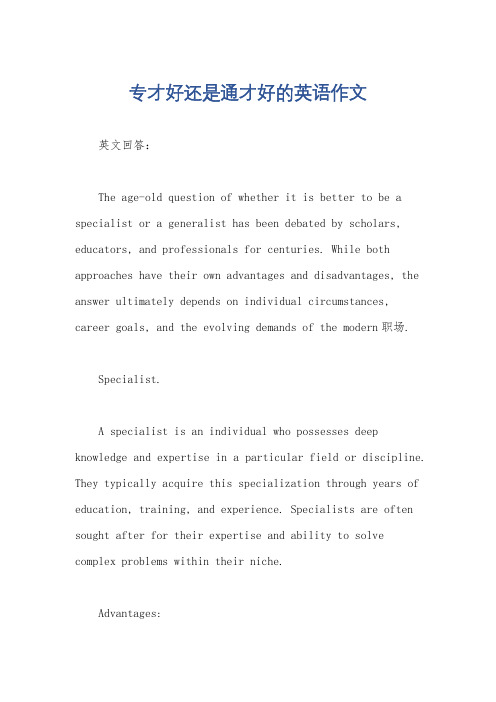
专才好还是通才好的英语作文英文回答:The age-old question of whether it is better to be a specialist or a generalist has been debated by scholars, educators, and professionals for centuries. While both approaches have their own advantages and disadvantages, the answer ultimately depends on individual circumstances, career goals, and the evolving demands of the modern职场.Specialist.A specialist is an individual who possesses deep knowledge and expertise in a particular field or discipline. They typically acquire this specialization through years of education, training, and experience. Specialists are often sought after for their expertise and ability to solve complex problems within their niche.Advantages:In-depth knowledge: Specialists have a comprehensive understanding of their chosen field, which allows them to provide highly specialized advice and solutions.Expertise: They possess a high level of skill and proficiency in their area of expertise, making them valuable assets to organizations.Increased earning potential: Specialists often command higher salaries due to their unique skills and knowledge.Disadvantages:Limited scope: Specialists may be restricted in their career opportunities outside of their specialized field.Reduced adaptability: Changes in technology orindustry trends can make their expertise less relevant or obsolete.Potential for burnout: The intense focus on a singlearea can lead to stress and burnout.Generalist.A generalist possesses a broad range of knowledge and skills across multiple disciplines. They are often described as having a "jack-of-all-trades, master-of-none" approach. Generalists are well-rounded individuals who can adapt to different situations and take on a variety of roles.Advantages:Adaptability: Generalists can easily transition between different industries and job roles due to their diverse skillset.Problem-solving ability: Their broad knowledge base allows them to approach problems from multiple perspectives and find creative solutions.Increased job opportunities: Generalists areattractive to employers who value versatility and a willingness to learn new skills.Disadvantages:Limited depth of knowledge: Generalists may lack the specialized expertise of specialists, which can limit their earning potential in certain fields.Difficulty standing out: In highly competitive job markets, generalists may struggle to differentiate themselves from more specialized candidates.Potential for lower salaries: Compared to specialists, generalists typically earn lower salaries due to their broad skillset rather than deep expertise.Conclusion.The choice between being a specialist or a generalistis a personal one that should be based on individual interests, career aspirations, and the current job market.While specialists offer expertise and a higher earning potential, generalists possess adaptability and a wider range of job opportunities. Ultimately, the best path is the one that aligns with one's strengths, passions, and long-term goals.中文回答:专才与通才之辩是一个经久不衰的话题,学术界、教育界和职场人士对此争论不休。
专才好还是通才英语作文

专才好还是通才英语作文Title: Specialization vs. Generalization: Striking the Balance。
In today's rapidly evolving world, the debate between specialization and generalization has garnered significant attention. While some argue in favor of becoming a specialist in a particular field, others advocate for being a generalist with diverse skills and knowledge. Both approaches have their merits, and striking the right balance is crucial for personal and professional development.Firstly, let's delve into the advantages of specialization. Becoming a specialist allows individuals to delve deep into a specific subject or field, mastering its intricacies and nuances. This depth of knowledge can lead to groundbreaking discoveries, innovations, and advancements in various industries. Specialists often command higher salaries and are highly sought after intheir respective fields due to their expertise.Take, for example, the field of medicine. A cardiac surgeon who specializes in heart surgeries possesses an unparalleled level of expertise in his domain. His focused knowledge and experience enable him to perform complex procedures with precision and accuracy, ultimately saving lives and improving patient outcomes. In fields such as medicine, engineering, and technology, specialization is often necessary to tackle complex problems effectively.On the other hand, there are compelling arguments in favor of being a generalist. Generalists possess a broad range of skills and knowledge across multiple domains, allowing them to adapt to diverse situations and challenges. They excel in roles that require versatility, creativity, and the ability to connect ideas from different disciplines. In today's interconnected world, where industries are constantly evolving and boundaries between fields are becoming increasingly blurred, generalists are well-positioned to thrive.Consider the role of a project manager in a multinational corporation. A generalist project manager must navigate through various departments, communicate effectively with diverse teams, and integrate different perspectives to ensure project success. Their ability to see the big picture while understanding the intricacies of different functions is invaluable in driving innovation and fostering collaboration.While specialization and generalization offer distinct advantages, neither approach is without its limitations. Over-specialization can lead to tunnel vision, where individuals become too narrowly focused on their area of expertise, potentially overlooking valuable insights from other fields. This can hinder innovation and limit one's ability to adapt to changing circumstances. Additionally, rapid advancements in technology and globalization have made certain specialized skills obsolete, emphasizing the need for agility and versatility.On the other hand, being a generalist may result in a lack of depth in any particular area, making it challengingto compete with specialists in highly specialized fields. Generalists may also struggle to gain recognition and credibility compared to specialists, especially in traditional industries where expertise is highly valued. Moreover, the breadth of knowledge required to be a generalist necessitates continuous learning and adaptation, which can be demanding and time-consuming.In conclusion, the debate between specialization and generalization is not about choosing one over the other but rather about finding the right balance between the two. While specialization provides depth of knowledge and expertise in a specific domain, generalization offers versatility and adaptability across diverse fields. The key lies in developing a hybrid skill set that combines deep expertise in one or two areas with a broad understanding of complementary disciplines. By striking this balance, individuals can position themselves for success in a dynamic and ever-changing world.。
学生应该成为专才还是通才英语作文
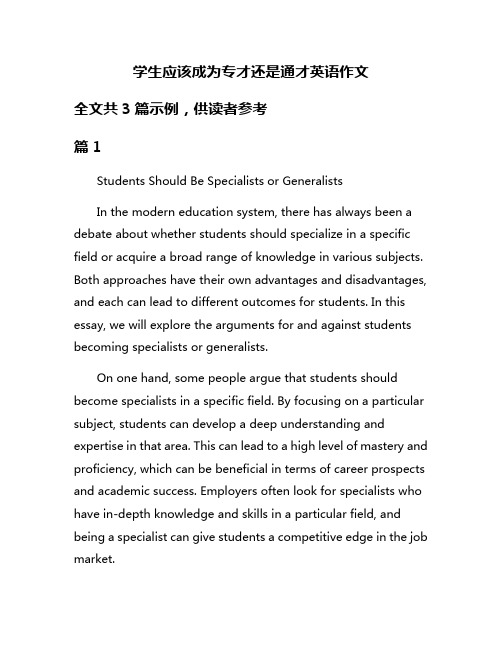
学生应该成为专才还是通才英语作文全文共3篇示例,供读者参考篇1Students Should Be Specialists or GeneralistsIn the modern education system, there has always been a debate about whether students should specialize in a specific field or acquire a broad range of knowledge in various subjects. Both approaches have their own advantages and disadvantages, and each can lead to different outcomes for students. In this essay, we will explore the arguments for and against students becoming specialists or generalists.On one hand, some people argue that students should become specialists in a specific field. By focusing on a particular subject, students can develop a deep understanding and expertise in that area. This can lead to a high level of mastery and proficiency, which can be beneficial in terms of career prospects and academic success. Employers often look for specialists who have in-depth knowledge and skills in a particular field, and being a specialist can give students a competitive edge in the job market.On the other hand, there are those who advocate for students to become generalists with a broad range of knowledge. By learning about various subjects, students can develop awell-rounded education and acquire a diverse set of skills. This can help students adapt to different situations and challenges, as well as foster creativity and critical thinking. In today's fast-paced and constantly changing world, having a broad range of knowledge can be advantageous in terms of lifelong learning and personal development.In conclusion, both specialists and generalists have their own merits and can lead to different outcomes for students. Ultimately, the choice between becoming a specialist or a generalist depends on the individual goals, interests, and strengths of each student. Some students may thrive as specialists in a specific field, while others may excel as generalists with a broad range of knowledge. Regardless of the path they choose, it is important for students to pursue their passions and interests, as well as continue learning and growing throughout their lives. Ultimately, whether students should become specialists or generalists is a personal decision that should be made based on individual goals, interests, and values.篇2Students should become specialists or generalists? This has been a long-standing debate in the education field. Some argue that students should focus on becoming specialists in a particular field, while others believe that students should strive to become generalists who have a wide range of knowledge and skills. In my opinion, I believe that students should strive to become both specialists and generalists, depending on their individual strengths and interests.Becoming a specialist in a particular field has its advantages. By focusing on a specific area of study, students can develop a deep understanding of the subject matter and become experts in that field. This can lead to career opportunities in specialized fields and can also be beneficial in terms of personal development. Specialists are often highly sought after in the job market and can command higher salaries due to their expertise.On the other hand, becoming a generalist also has its benefits. Generalists have a broad range of knowledge and skills, which can make them adaptable and versatile in a variety of situations. Being a generalist can also lead to a morewell-rounded education and can help students make connections between different areas of study. This can beparticularly useful in today's rapidly changing world, where the ability to adapt and learn new skills is highly valued.In my view, it is important for students to strike a balance between being a specialist and a generalist. While it is important to develop expertise in a particular field, it is also essential to have a broad base of knowledge and skills. This can help students to be more flexible, creative, and innovative in their thinking and can also prepare them for success in a variety of fields.Ultimately, whether a student should focus on becoming a specialist or a generalist depends on their individual strengths, interests, and career goals. Some students may thrive in a specialized field, while others may prefer to have a more diverse set of skills. It is important for educators to provide students with opportunities to explore both specialist and generalist pathways and to support them in developing a well-rounded education.In conclusion, students should strive to become both specialists and generalists in order to achieve success in today's competitive world. By developing expertise in a particular field while also cultivating a broad base of knowledge and skills, students can position themselves for success in a variety of fields and can adapt to the challenges of the future. Education shouldaim to provide students with the tools and opportunities to become both specialists and generalists, so that they can thrive in a rapidly changing world.篇3Students should become specialists or generalists?In today's rapidly developing world, the debate over whether students should specialize in a certain field or be more well-rounded in their studies has become a hot topic. Some argue that becoming a specialist allows individuals to go deep into a specific area and master the skills needed to excel in that particular field. Others believe that being a generalist equips students with a broader range of knowledge and skills, making them more adaptable and versatile in the ever-changing job market.Those in favor of specialization argue that it is important for students to focus on a particular area in order to become experts in that field. By dedicating their time and effort to mastering a specific subject, students can develop a deep understanding of the topic and acquire specialized skills that are valued in the job market. For example, a medical student who specializes in cardiology will be able to provide more advanced andspecialized care to patients with heart problems than a general practitioner.On the other hand, supporters of generalization believe that having a broad range of knowledge and skills is essential in today's world. With the rapid advancement of technology and the rise of automation, many jobs are being replaced by machines, making it important for individuals to have a diverse skill set that can be applied to a variety of industries. By being a generalist, students can adapt to different roles and industries, increasing their chances of success in a competitive job market.While both specialization and generalization have their own advantages, it is important for students to strike a balance between the two. By specializing in a certain field, students can develop expertise in a specific area and stand out from their peers. However, by also being well-rounded and versatile, students can adapt to changing job demands and pursue new opportunities as they arise.In conclusion, whether students should become specialists or generalists depends on their individual goals and interests. While specialization can lead to expertise in a specific field, generalization can provide students with a broad range of skills that are valuable in a dynamic job market. Ultimately, studentsshould consider their strengths and aspirations when deciding whether to specialize or generalize in their studies.。
通才与专才作文800字以上

通才与专才作文800字以上英文回答:In my opinion, being a well-rounded individual or a specialist both have their merits. On one hand, being a generalist, or a "jack of all trades," allows you to have a wide range of knowledge and skills. This can be advantageous in situations where you need to adapt quickly or handle various tasks. For example, if you work in a small company, you may be required to take on multiple roles and responsibilities. Being a generalist would enable you to handle different tasks efficiently and effectively.On the other hand, being a specialist, or an expert in a specific field, can also be highly valuable. Specialization allows individuals to focus their efforts and become highly skilled in a particular area. This can lead to greater expertise and recognition in that field. For instance, a doctor who specializes in a specific medical condition would be able to provide more accuratediagnoses and treatment options compared to a general practitioner.中文回答:在我看来,通才和专才都有各自的优点。
通才和专才为话题作文

通才和专才为话题作文英文回答:In my opinion, being a generalist or a specialist both have their own advantages and disadvantages. Let's start with the generalist.Being a generalist means having a wide range of knowledge and skills in different areas. This can be beneficial in various situations. For example, if you are a generalist, you can easily adapt to different tasks and roles. You can handle different projects and work with different teams. This flexibility can make you a valuable asset in a company or organization.Moreover, being a generalist allows you to have a broader perspective. You can see the big picture and connect the dots between different fields. This can lead to innovative ideas and solutions. For instance, a generalist in the field of technology and design can come up withcreative solutions by combining different concepts and approaches.On the other hand, being a specialist also has its own advantages. A specialist focuses on a specific field or area and becomes an expert in it. This expertise can lead to high-quality work and deep understanding of the subject matter. For example, a specialist in medicine can provide accurate diagnoses and effective treatments for specific conditions.Furthermore, being a specialist can lead to career advancement and higher earning potential. Companies and organizations often value specialists who have in-depth knowledge and skills in a particular field. They arewilling to pay a premium for their expertise. For instance, a specialist in finance can command a higher salary compared to a generalist in the same industry.中文回答:在我看来,成为通才或专才都有各自的优势和劣势。
专才好还是通才英语作文
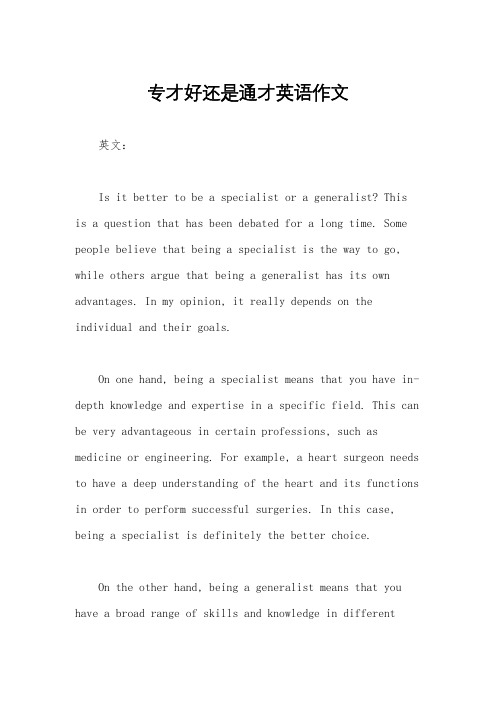
专才好还是通才英语作文英文:Is it better to be a specialist or a generalist? Thisis a question that has been debated for a long time. Some people believe that being a specialist is the way to go, while others argue that being a generalist has its own advantages. In my opinion, it really depends on the individual and their goals.On one hand, being a specialist means that you have in-depth knowledge and expertise in a specific field. This can be very advantageous in certain professions, such as medicine or engineering. For example, a heart surgeon needs to have a deep understanding of the heart and its functions in order to perform successful surgeries. In this case, being a specialist is definitely the better choice.On the other hand, being a generalist means that you have a broad range of skills and knowledge in differentareas. This can be beneficial in professions that require versatility and adaptability, such as marketing or entrepreneurship. For instance, a successful entrepreneur needs to have a good grasp of various aspects of business, including marketing, finance, and operations. In this scenario, being a generalist would be more advantageous.中文:是专才好还是通才?这是一个长期争论的问题。
学生应该成为专才还是通才英语作文
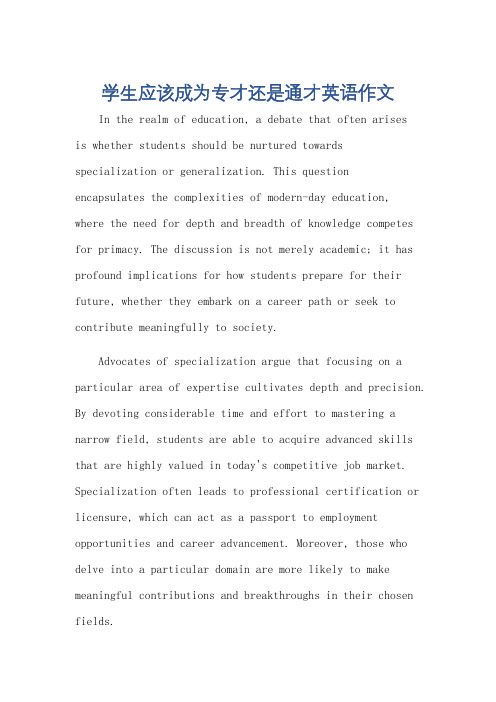
学生应该成为专才还是通才英语作文In the realm of education, a debate that often arisesis whether students should be nurtured towardsspecialization or generalization. This questionencapsulates the complexities of modern-day education,where the need for depth and breadth of knowledge competes for primacy. The discussion is not merely academic; it has profound implications for how students prepare for their future, whether they embark on a career path or seek to contribute meaningfully to society.Advocates of specialization argue that focusing on a particular area of expertise cultivates depth and precision. By devoting considerable time and effort to mastering a narrow field, students are able to acquire advanced skills that are highly valued in today's competitive job market. Specialization often leads to professional certification or licensure, which can act as a passport to employment opportunities and career advancement. Moreover, those who delve into a particular domain are more likely to make meaningful contributions and breakthroughs in their chosen fields.On the other hand, proponents of generalizationmaintain that a broad-based education prepares students for the unpredictability of the future. As technology andsociety rapidly evolve, the ability to adapt and pivot becomes increasingly important. A generalist education, encompassing a diverse range of subjects, equips students with a versatile toolbox of skills and perspectives. This flexibility allows individuals to navigate changing landscapes, whether it's switching careers, adapting to new technologies, or contributing to interdisciplinary projects. However, the choice between specialization and generalization is not an either-or proposition. In reality, the most effective approach might be a hybrid of both. Students can benefit from developing a strong foundation of general knowledge and skills, which provides a solid foundation for further specialization. This approach allows individuals to explore various fields and interests, gain a broad understanding of the world, and then focus on areas that align with their passions and career aspirations.Moreover, the modern world demands a blend of both specialized and generalized abilities. Increasingly,problems and challenges require interdisciplinary solutions, where knowledge and skills from multiple fields converge.In such scenarios, individuals with a blend ofspecialization and generalization are more likely to find innovative solutions.In conclusion, the debate between specialization and generalization in student development is complex and multifaceted. While specialization offers depth and precision, generalization confers breadth and adaptability. The ideal approach might be a harmonious blend of both, where students are encouraged to explore a diverse range of subjects and interests while also deepening their understanding and skills in areas of particular interestand expertise. This approach equips individuals with the knowledge, skills, and perspectives necessary to navigatethe complexities of the modern world and contribute meaningfully to society.**学生发展中的专业化与通才化困境**在教育领域,一个经常出现的辩论是学生应该被培养成为专业人才还是通才。
全才和专才的作文800
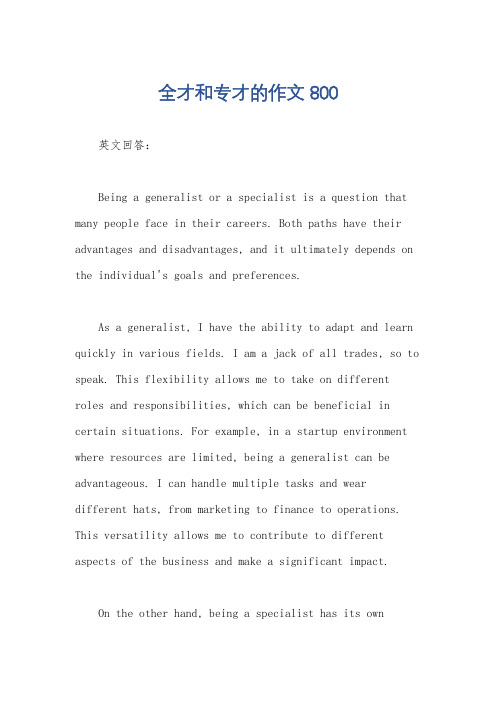
全才和专才的作文800英文回答:Being a generalist or a specialist is a question that many people face in their careers. Both paths have their advantages and disadvantages, and it ultimately depends on the individual's goals and preferences.As a generalist, I have the ability to adapt and learn quickly in various fields. I am a jack of all trades, so to speak. This flexibility allows me to take on different roles and responsibilities, which can be beneficial in certain situations. For example, in a startup environment where resources are limited, being a generalist can be advantageous. I can handle multiple tasks and weardifferent hats, from marketing to finance to operations. This versatility allows me to contribute to different aspects of the business and make a significant impact.On the other hand, being a specialist has its ownmerits. Specialists possess deep knowledge and expertise in a specific field. They are the go-to person for aparticular subject matter. This level of specialization can lead to career growth and recognition. For instance, a doctor who specializes in a specific medical field may have more opportunities for research and advancements in their career. They can become renowned experts in their field and make significant contributions to their industry.中文回答:作为一个全才或者专才是许多人在职业生涯中面临的问题。
通才和专才为话题作文
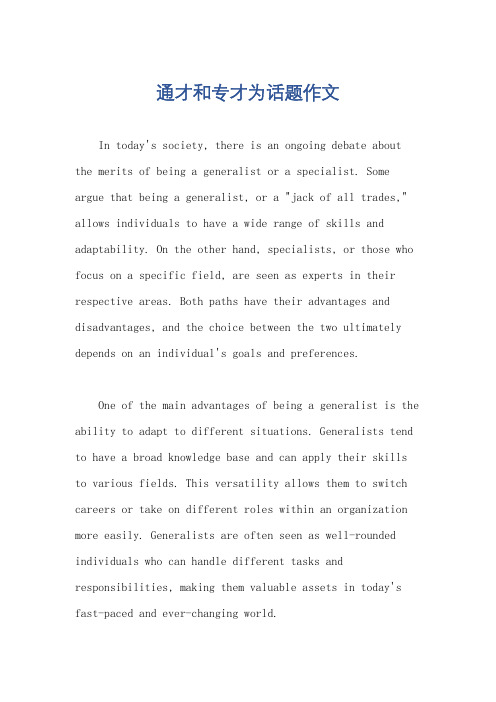
通才和专才为话题作文In today's society, there is an ongoing debate about the merits of being a generalist or a specialist. Some argue that being a generalist, or a "jack of all trades," allows individuals to have a wide range of skills and adaptability. On the other hand, specialists, or those who focus on a specific field, are seen as experts in their respective areas. Both paths have their advantages and disadvantages, and the choice between the two ultimately depends on an individual's goals and preferences.One of the main advantages of being a generalist is the ability to adapt to different situations. Generalists tend to have a broad knowledge base and can apply their skills to various fields. This versatility allows them to switch careers or take on different roles within an organization more easily. Generalists are often seen as well-rounded individuals who can handle different tasks and responsibilities, making them valuable assets in today's fast-paced and ever-changing world.Another advantage of being a generalist is the ability to make connections between different fields. Generalists often have a unique perspective that specialists may lack. They can draw upon knowledge and experiences from various domains to solve complex problems or come up with innovative ideas. This interdisciplinary approach can lead to breakthroughs and advancements that specialists may not have considered.However, being a generalist also has its drawbacks. With a broad focus, generalists may lack the depth of knowledge and expertise that specialists possess. In highly specialized fields, such as medicine or engineering, a deep understanding of the subject matter is crucial. Generalists may struggle to keep up with the latest advancements and may not be able to provide the same level of expertise as a specialist.On the other hand, specialists are experts in their respective fields. They have spent years honing theirskills and acquiring in-depth knowledge in a specific area.This expertise allows them to provide valuable insights and solutions that may not be apparent to generalists. Specialists are often highly sought after for their expertise and can command higher salaries and job opportunities in their respective fields.Specialists also have the advantage of being able to focus on a specific area of interest. They can delve deep into a subject and become true masters of their craft. This level of specialization can lead to groundbreaking discoveries and advancements in their field. Specialists often have a deep passion for their work, which can be a driving force behind their success.However, the narrow focus of specialists can also be a disadvantage. In rapidly changing industries, specialists may find it challenging to adapt to new technologies or developments outside their area of expertise. They may become too specialized to the point where their skills are no longer in demand or relevant. Additionally, specialists may struggle with interdisciplinary collaboration, as their narrow focus may limit their ability to see the biggerpicture or consider alternative perspectives.In conclusion, both generalists and specialists have their merits and drawbacks. Generalists are adaptable and versatile, able to apply their skills across different fields and make connections between disciplines. On the other hand, specialists have in-depth knowledge and expertise in a specific area, allowing them to provide valuable insights and solutions. The choice between the two ultimately depends on an individual's goals, preferences, and the demands of the industry. Ultimately, a combination of both generalists and specialists can lead to a well-rounded and innovative society.。
关于通才与专才的作文题目
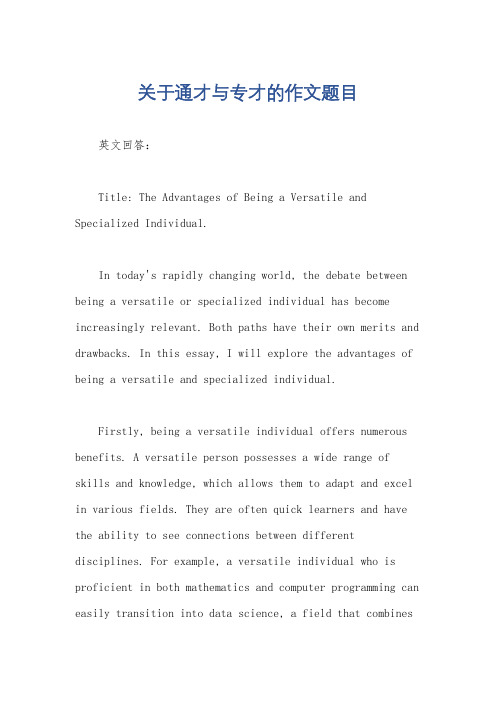
关于通才与专才的作文题目英文回答:Title: The Advantages of Being a Versatile and Specialized Individual.In today's rapidly changing world, the debate between being a versatile or specialized individual has become increasingly relevant. Both paths have their own merits and drawbacks. In this essay, I will explore the advantages of being a versatile and specialized individual.Firstly, being a versatile individual offers numerous benefits. A versatile person possesses a wide range of skills and knowledge, which allows them to adapt and excel in various fields. They are often quick learners and have the ability to see connections between different disciplines. For example, a versatile individual who is proficient in both mathematics and computer programming can easily transition into data science, a field that combinesboth skills. Moreover, versatility fosters creativity and innovation, as individuals are exposed to different perspectives and can draw inspiration from diverse sources.On the other hand, being a specialized individual also has its advantages. Specialization allows individuals to develop a deep understanding and expertise in a specific area. They become masters in their field and are often highly sought after for their specialized knowledge. For instance, a specialized surgeon who has dedicated years to perfecting their surgical skills can perform complex procedures with precision and confidence. Additionally, specialization provides a sense of purpose and fulfillment, as individuals are able to make significant contributions and advancements in their chosen field.中文回答:标题,通才与专才的优势。
专才胜于全才的作文800字
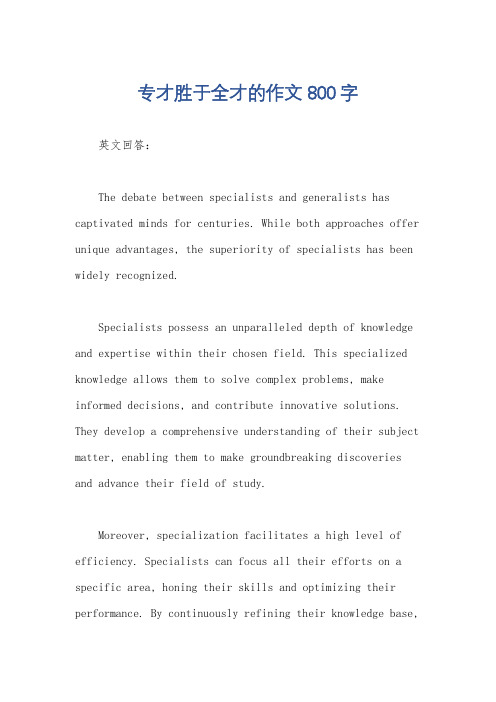
专才胜于全才的作文800字英文回答:The debate between specialists and generalists has captivated minds for centuries. While both approaches offer unique advantages, the superiority of specialists has been widely recognized.Specialists possess an unparalleled depth of knowledge and expertise within their chosen field. This specialized knowledge allows them to solve complex problems, make informed decisions, and contribute innovative solutions. They develop a comprehensive understanding of their subject matter, enabling them to make groundbreaking discoveries and advance their field of study.Moreover, specialization facilitates a high level of efficiency. Specialists can focus all their efforts on a specific area, honing their skills and optimizing their performance. By continuously refining their knowledge base,they become experts in their niche and can produce exceptional outcomes.In contrast, generalists have a broader knowledge base that encompasses multiple disciplines. While they may have a wider perspective, their knowledge in each area is often superficial. This may limit their ability to solve complex problems, as they lack the specialized insights necessary.Furthermore, generalists may face challenges in keeping up with the rapid pace of technological and scientific advancements. The ever-evolving nature of knowledge requires constant learning and specialization, which may be difficult for generalists who spread their efforts across multiple fields.While generalists may be better suited for roles that require a broad understanding of various disciplines, in most cases, the advantages of specialization outweigh those of generalization. Specialists possess the expertise, efficiency, and depth of knowledge necessary to drive innovation, solve complex problems, and make significantcontributions to their field.中文回答:在专才与通才的争论中,专才的优势早已广受认可。
通才和专才作文素材
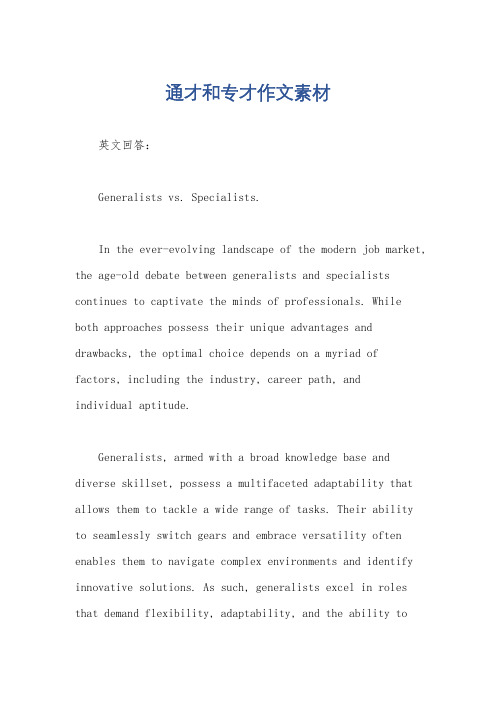
通才和专才作文素材英文回答:Generalists vs. Specialists.In the ever-evolving landscape of the modern job market, the age-old debate between generalists and specialists continues to captivate the minds of professionals. While both approaches possess their unique advantages and drawbacks, the optimal choice depends on a myriad of factors, including the industry, career path, andindividual aptitude.Generalists, armed with a broad knowledge base and diverse skillset, possess a multifaceted adaptability that allows them to tackle a wide range of tasks. Their abilityto seamlessly switch gears and embrace versatility often enables them to navigate complex environments and identify innovative solutions. As such, generalists excel in roles that demand flexibility, adaptability, and the ability toconnect the dots across disparate disciplines.Specialists, on the other hand, exhibit depth and mastery within a particular domain. Their unwavering focus on a specific field allows them to develop a comprehensive understanding, unparalleled expertise, and cutting-edge skills. By honing their knowledge and abilities in a targeted area, specialists become indispensable experts, capable of solving complex problems that evade generalists.The choice between generalist and specialist is not a one-size-fits-all proposition. Generalists thrive in industries and roles that require a broad understanding of the field, the ability to synthesize information from various sources, and the flexibility to adapt to changing circumstances. On the other hand, specialists excel in highly specialized fields, where deep expertise and technical proficiency are paramount.Ultimately, the optimal choice depends on theindividual's strengths, interests, and career aspirations. Those with a natural curiosity, an affinity for diverseexperiences, and a desire to explore multiple facets of a field may find fulfillment as generalists. Conversely, individuals drawn to deep knowledge, technical mastery, and the pursuit of specialized expertise may find solace as specialists.中文回答:通才与专才。
成为一个专才还是通才ToBecomeaSpecialistor
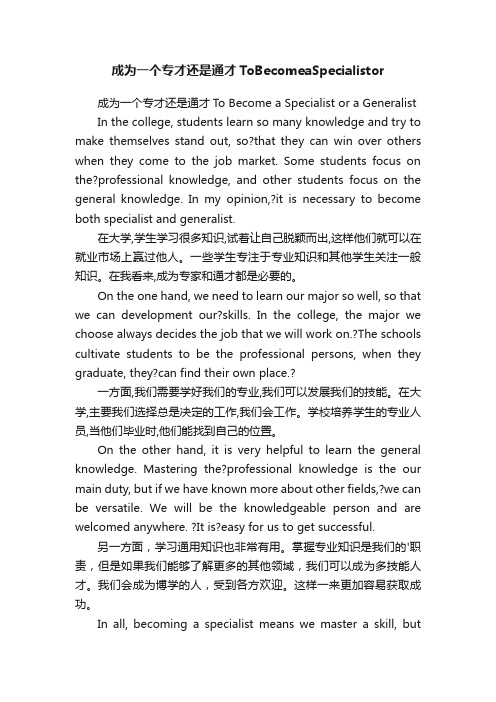
成为一个专才还是通才ToBecomeaSpecialistor成为一个专才还是通才To Become a Specialist or a Generalist In the college, students learn so many knowledge and try to make themselves stand out, so?that they can win over others when they come to the job market. Some students focus on the?professional knowledge, and other students focus on the general knowledge. In my opinion,?it is necessary to become both specialist and generalist.在大学,学生学习很多知识,试着让自己脱颖而出,这样他们就可以在就业市场上赢过他人。
一些学生专注于专业知识和其他学生关注一般知识。
在我看来,成为专家和通才都是必要的。
On the one hand, we need to learn our major so well, so that we can development our?skills. In the college, the major we choose always decides the job that we will work on.?The schools cultivate students to be the professional persons, when they graduate, they?can find their own place.?一方面,我们需要学好我们的专业,我们可以发展我们的技能。
在大学,主要我们选择总是决定的工作,我们会工作。
- 1、下载文档前请自行甄别文档内容的完整性,平台不提供额外的编辑、内容补充、找答案等附加服务。
- 2、"仅部分预览"的文档,不可在线预览部分如存在完整性等问题,可反馈申请退款(可完整预览的文档不适用该条件!)。
- 3、如文档侵犯您的权益,请联系客服反馈,我们会尽快为您处理(人工客服工作时间:9:00-18:30)。
高中英语作文:成为一个专才还是通才
In the college, students learn so many knowledge and try to make themselves stand out, so that they can win over others when they come to the job market. Some students focus on the professional knowledge, and other students focus on the general knowledge. In my opinion, it is necessary to become both specialist and generalist.
在大学,学生学习很多知识,试着让自己脱颖而出,这样他们就能够在就业市场上赢过他人。
一些学生专注于专业知识和其他学生注重一般知识。
在我看来,成为专家和通才都是必要的。
On the one hand, we need to learn our major so well, so that we can development our skills. In the college, the major we choose always decides the job that we will work on. The schools cultivate students to be the professional persons, when they graduate, they can find their own place.
一方面,我们需要学好我们的专业,我们能够发展我们的技能。
在大学,主要我们选择总是决定的工作,我们会工作。
学校培养学生的专业人员,当他们毕业时,他们能找到自己的位置。
On the other hand, it is very helpful to learn the general knowledge. Mastering the professional knowledge is the our main duty, but if we have known more about other fields, we can be versatile. We will be the knowledgeable person and are welcomed anywhere. It is easy for us to get successful.
另一方面,学习通用知识也非常有用。
掌握专业知识是我们的职责,但是如果我们能够了解更多的其他领域,我们能够成为多技能人
才。
我们会成为博学的人,受到各方欢迎。
这样一来更加容易获取成功。
In all, becoming a specialist means we master a skill, but becoming a generalist can complete a person and help him to be a better one.
总之,成为一个专才我们只掌握一门技能,而成为一个通才则能够完善个人,变得更好。
